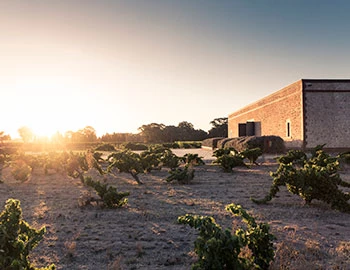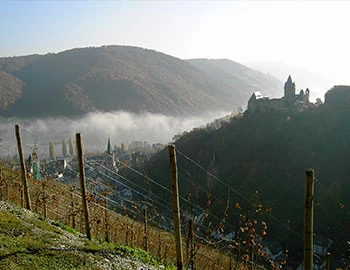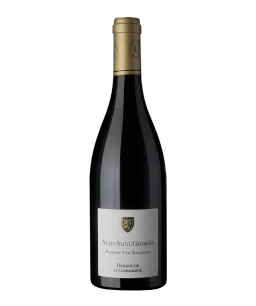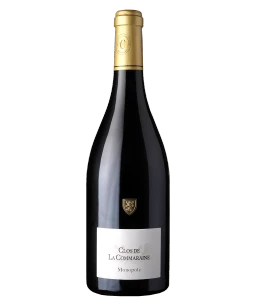Domaine de la Commaraine
The beauty behind the walls of Château Commaraine
The Burgundian municipality of Pommard has a classic, historic ambience with most of the buildings and walled vineyards (clos) intact, exuding a peaceful and tranquil atmosphere. The small, romantic village square conveys a slightly exotic feeling to its visitors – an unusual sensation in rural Burgundy indeed!
Clos de la Commaraine, a Monopole Premier Cru just outside the village centre of Pommard is an incredible vineyard waiting to be rediscovered. It is an outstanding estate in every respect, with a beautiful château in the southern part of the vineyard, on the outskirts of the village. The vineyard is owned by Harvard professor Denise Dupré and Mark Nunnelly, a former managing director at the Boston-based investment fund Bain Capital. Also on board is Jean-Luc Vitoux – a French investor and current director of La Commaraine. Now, under the passionate care of the new owners and a brilliant team, it is also well on its way to setting a new benchmark in Pommard. No expense is being spared to tease out the best wine from the terroir of the clos, from the cultivation of the vines to the selection and vinification.
The debut wine 2018 Clos de la Commaraine Monopole from Domaine de la Commaraine is simply stunning. Luxurious, detailed and refined, this is undoubtedly a very special wine. The 2018 harvest marked the next chapter in the life of Burgundy’s landmark Clos de la Commaraine. Situated in the highly regarded Côte-d’Or, the estate comprises 3.75 hectares of Pommard 1er Cru vines grown in a monopole and now cultivated for the production of biodynamic wines. The last wine produced under the label of the single vineyard Commaraine dates back to 2002 – since then the grapes have been sold to Maison Louis Jadot and produced under the Jadot label.
White wines from Domaine de la Commaraine
Red wines from Domaine de la Commaraine
from Domaine de la Commaraine
The estate is also the site of a 12th century château with historical threads leading back to the Dukes of Burgundy. It had been vacant since 2013, but is being lavishly renovated and converted into a five-star hotel, an underground spa in the 14th-century cellars and a restaurant – a vision of the two Americans Denise Dupré and Mark Nunelly, who also own the luxury hotel Royal Champagne and the organic champagne house Leclerc-Briant. With the acquisition of Clos de la Commaraine, the couple also took over the Domaine Belleville in Rully and the Manoir Murisaltien in Meursault. The boutique hotel with its 23 rooms is somewhat off the beaten track. “We want to offer our guests something beyond just ‘staying at a great hotel’”, says director Jean-Luc Vitoux.
“We also want to share our passion with the guests by involving them in the agricultural and winemaking work to familiarise them with the terroir of the clos”, says Vitoux. This work is to be carried out according to organic (or ‘bio’ as the French call it) and biodynamic principles while the new team converts the vineyards. “Sustainability is a key part of our value with biodynamic farming for the whole estate”, says Vitoux. Even before the conversion, the estate was farmed ecologically, with just a single chemical used during the flowering period. This spring, sheep grazed the vines under the supervision of two vineyard experts who have been tending the vines for over 20 years. “Wine is at the heart of the project”, says trade and marketing director Hugues Romagnan.
The 2018 harvest was carried out plot by plot and vinified separately, with decisions on blending to be made in June. “We have to understand the terroir by playing with ten plots”, says Vitoux. An interesting approach was chosen to understand the terroir: an electromagnetic conductivity study of soil variability, carried out by the Chilean company AgroPrecision. “At the end of spring we will conduct an analysis of the vines and leaves to see if they are in good shape and ‘well-nourished’, or if some nutrient or component is missing”, says Vitoux.
Producer

Tenuta Castello di Morcote
The vineyard of the Tenuta Castello di Morcote is widely held to be one of the most beautiful in Ticino. It lies some 200 metres above the picturesque village of Vico Morcote and offers a stunning view of the mountains and the Lago di Lugano. At the heart of this vineyard are the ruins of the Castello di Morcote.

Standish / Dan Standish
The Standish Wine company was founded in 1999 by Dan Standish. He started at that time with a small, family-owned plot of almost hundred-year-old Shiraz vines in the heart of the Barossa Valley, in the sub-region of Vine Vale. He is part of the sixth generation of immigrants who settled here in 1848. In his career, Dan Standish gained experience not only in his home country, but also in California, Spain and France. He is passionate about the great wines of the Rhône Valley.

Weingut Ratzenberger / Fam. Ratzenberger
The most beautiful way of traveling to Bacharach on the Rhine is by boat, passing the famous Loreley cliff. To the left and right of the Middle Rhine, medieval castles and picturesque villages follow in quick succession. Bacharach is one of the most beautiful towns in the Upper Middle Rhine Valley, designated a UNESCO World Heritage Site. Once there, the locality of Steeg can be reached on foot within half an hour or by car in just five minutes.











